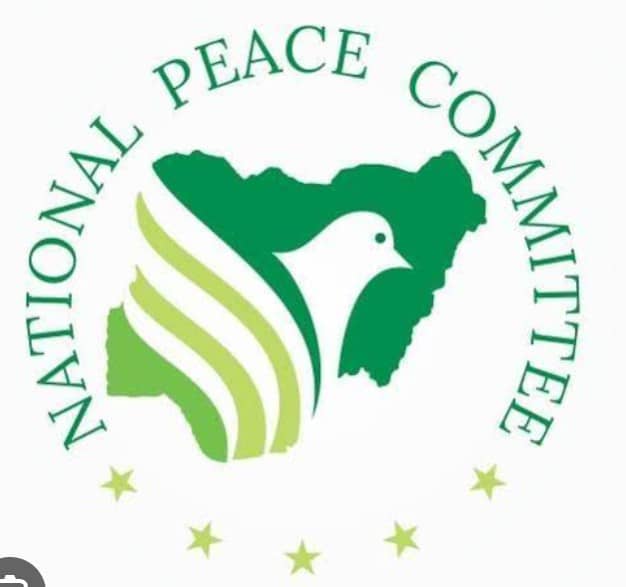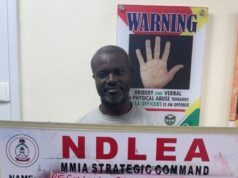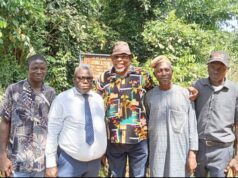By editor
Ahead of the 2027 general elections, the National Peace Committee (NPC), hosted by the Kukah Centre, with support from the European Union (EU), has inaugurated an Election Security Information Hub aimed at gathering, analysing, and sharing data on insecurity and electoral offenses to promote credible and peaceful elections in Nigeria.
The initiative underscores the Peace NPC’s resolve to use technology, research, and collaboration to support credible governance and national stability ahead of the November off-cycle Anambra State governorship election and the 2027 general elections.
At the inauguration ceremony on Wednesday in Abuja, the Chairman of the National Peace Committee, Retired General Abdulsalami Abubakar, said the initiative was designed to transform early warnings into coordinated, timely, and lawful responses by critical stakeholders.
Represented by Retired General Martin Luther Agwai, General Abubakar said the hub would ensure that interventions during elections are guided by verified data rather than sentiments.
“The hub represents a significant evolution in Nigeria’s democratic architecture, moving from commitment to coordination, from goodwill to credible information, and from pledges to prevention. It will help detect, prevent, and respond to risks before they escalate into violence. This is how we can safeguard peace and strengthen democracy.” General Agwai stated.
He said that the initiative underscores the Peace Committee’s resolve to use technology, research, and collaboration to support credible governance and national stability ahead of the 2027 general elections.
Also speaking at the launch, the Executive Secretary of the Kukah Centre and Head of the National Peace Committee Secretariat, Rev. Fr. Atta Barkindo, stated that the Election Security Information Hub was established to bridge the information gap among institutions working on election security.
“For years, we have relied on goodwill and moral persuasion to maintain peace during elections. However, peace cannot thrive on sentiments alone. It must be anchored on verified data, evidence-based engagement, and timely response,” Barkindo said.
According to him, the hub would bring together the Independent National Electoral Commission (INEC), security agencies, civil society organisations, and the media to share real-time information and coordinate early warning and response strategies.
He stated, “The Kukah Centre has developed state-based peace architectures across 26 states and is already piloting early warning and early response systems in Anambra and other states.
“Through these systems, local actors can provide us with verified, community-based intelligence that will feed into this national platform. This is how we can respond quickly and prevent violence before it begins.”
Barkindo said that the importance of accuracy and integrity in data collection cannot be over-emphasized, noting that in an era of misinformation and fake news, one verified report is more valuable than a thousand unconfirmed claims.
“With the rise of disinformation, we are committed to quality over quantity. If we are passing information to members of the NPC, people like Gen. Abdulsalami Abubakar and John Cardinal Onaiyekan, and others, it must be accurate and reliable. They engage government at the highest levels, so false information is not an option,” he said.
He urged the media to play a proactive role in verifying and sharing accurate data, emphasizing that the success of the hub depends on collaboration and transparency.
The acting Chaiman of the INEC, Mrs May Agbamuche-Mbu, represented by the Director of Planning and Monitoring, Mrs Helen Ajayi, assured of the commission’s commitment to transparency, inclusivity, and security in electoral processes.
According to her, the commission’s Election Risk Management Tool already maps out risk-prone areas to guide proactive interventions.
She stated, “INEC welcomes this partnership with The Kukah Centre and the Peace Committee. By combining our data-driven risk assessments with the hub’s collaborative intelligence system, we can strengthen voter confidence and ensure that every election reflects the true will of the people.”
On his part, the Head of Governance, Gender, Human Rights, and Migration Section at the EU Delegation to Nigeria and ECOWAS, Ruben Aguilera, said that the hub represents a shift from moral persuasion to evidence-based intervention.
“This initiative transforms peacebuilding from being reactive to being preventive.
It enables the tracking of electoral offenses and incidents across the country and promotes accountability. The EU envisions a Nigeria where democracy flourishes and citizens can express their choices without fear or intimidation,” Aguilera said.
Discover more from TheTimes Nigeria
Subscribe to get the latest posts sent to your email.









